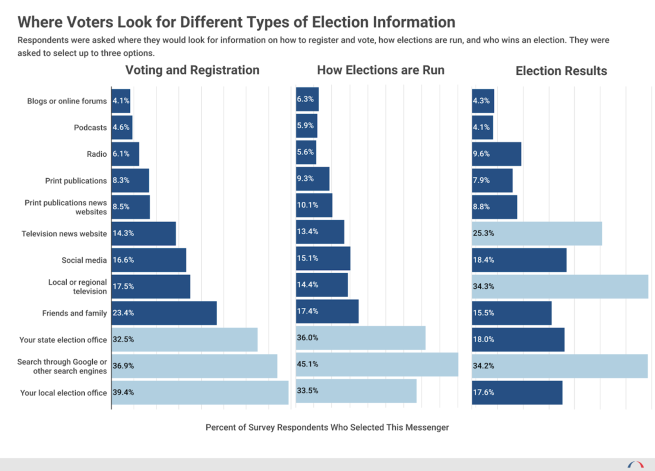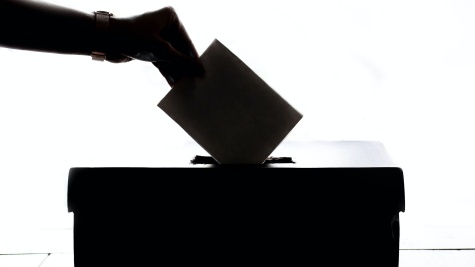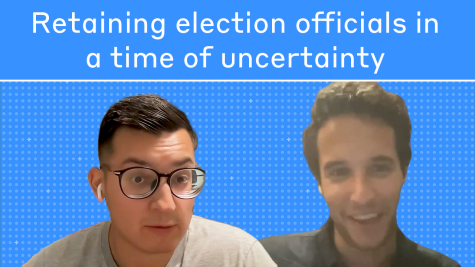Whom Can I Trust?
Exploring the American Public’s Favored Sources of Election Information
The MIT Election Data and Science Lab helps highlight new research and interesting ideas in election science, including through research grants under our ongoing Learning from Elections program.
Our post today was written by Collier Fernekes, Katie Harbath, Rachel Orey, Mara Suttmann-Lea, and Michael Wagner, based on their ongoing research funded by this program. The information and opinions expressed in this column represent their own research, and do not necessarily represent the opinions of the MIT Election Lab or MIT.
Trust and confidence in election administration is foundational for a healthy democracy. However, the rising threat of election mis- and dis-information from high level political actors has threatened Americans’ faith in how elections are run.
One way to mitigate this trend may be the presence of sources of election-related information that instill greater confidence in ballot counting than others. To identify which sources of information insulate voter confidence, we draw from a nationally representative survey conducted in October of 2022, with an oversampling of registered voters Colorado, Georgia, and Wisconsin.
The centerpiece of this survey was a set of questions that asked respondents to choose three preferred messengers and sources of election information from a list including their local election official, their state election official, social media, blogs, podcasts, and more. This question was asked three times about different pieces of election-related information: how to vote, election processes, and election results.
The key question we consider is whether there is a relationship between respondents’ preferred messengers and sources on each dimension of election information and overall voter confidence. We focus specifically on developing and testing expectations for whether respondents who selected state and local election offices as their preferred sources of information have greater confidence in ballot counting, but also examine these relationships for other preferred sources selected by respondents.
The goal of this analysis is to establish whether there is a link between the sources respondents choose or prefer for election information and confidence in ballot counting at the personal (voters’ personal or community’s votes) and national (state or national results) levels. We focus on these two levels of voter confidence because of the established gap between them; on average, individuals are far less likely to trust that ballots cast across the country were counted as intended, relative to their own vote. We anticipate that individuals who preferred state and local election officials as official sources of information will be most likely to express confidence in ballot counting for both measures of confidence, relative to their counterparts who selected other sources of information.
Initial Findings
State and local chief election officials are highly preferred for delivering election information across political party affiliation, age, and other key demographics relative to other messengers for information about voting and how elections are run. For information about who won an election, voters are most likely to look to national television, local television, or a search engine.
Republicans exhibit lower trust across messengers, even when the messenger is from their own party. Voters nationally are more likely to agree with a statement that election results can be trusted when it is made by their chief state election official, rather than a Republican or Democratic party leader. Even when the statement that 'Election results can be trusted because they reflect an accurate counting of valid votes’ is made by a Republican party leader, only 34% of Republicans agreed with the statement (with 36% disagreeing, with the remaining neutral or unsure).
Read more initial findings in New Survey Data on Who Americans Look to For Election Information.
Is preference for information from an election official associated with increased trust?
Our central hypothesis is that voters selecting their state or local election office as a source of information about where to vote are more likely to be armed with accurate information about the registration and voting process. In turn, they should be more likely to have regular positive voting experiences and higher confidence in ballot counting (Suttmann-Lea and Merivaki 2022). We also suspect the selection of local election offices in particular will be more likely to generate higher levels of confidence, given the higher levels of trust that the public tends to place in these offices relative to other public offices (Adona and Gronke 2018).
Our results partially confirm our expectations. Voters who selected their local election office as a source they are likely to turn to for information about how to register and vote were more likely to have confidence in ballot counting at the personal and local level, but not at the state or national level. Somewhat surprisingly, respondents who selected their state election office as a source were less likely to have confidence in ballot counting at the personal and state level.
These patterns were also reflected when we broke respondents out to examine results among only Republicans, although the selection of a state election office as a source of information was related to lower confidence at the personal, local, and state level. We view this finding with caution, as it is possible there are unmeasured factors not captured by our analysis driving the relationship between the selection of local election offices as a source of information and Republican confidence and the personal and local level of ballot counting.
While the positive relationship between the selection of local election offices as a source of information about how to register and vote, and voter confidence at the personal and local level is an encouraging finding, these results also reflect the persistent difficulty of supporting greater voter confidence in ballot counting in places further removed from home. This is especially concerning given the false narratives about improprieties in ballot counting in select states across the country that plagued the 2020 presidential election and persisted, albeit on a smaller scale, during the 2022 midterm election.
Next Steps
The richness of the dataset provides a litany of potential avenues to explore. Thus far, our analysis has focused on partisan trends in voter confidence and the relationship between selection of an election official as a preferred messenger and confidence in results. Moving forward, we hope to assess the potential role of alternative messengers and explore state-specific trends in Colorado, Georgia, and Wisconsin.
This paper represents the tip of the iceberg in terms of understanding the impact of the public’s choice of election-related information on voter confidence. It will be important for future work to parse out the relationship between other sources of information about how to register and vote and voter confidence, such as news outfits and political actors. Moreover, the negative relationship between the selection of state election offices as a source of election-related information deserves closer scrutiny, as it is possible there are important differences in the voter education and outreach efforts of state election offices that may provide a more nuanced insight into this relationship (Suttmann-Lea and Merivaki 2022).
Finally, this evidence suggests that local election officials have maintained their position as the backbone and stewards of American democracy (Adona et al 2019, Adona and Gronke 2018). As such, it will be vital to better understand what might drive the public to look to their local election officials as the most trusted sources of information about how to register and vote in elections.




